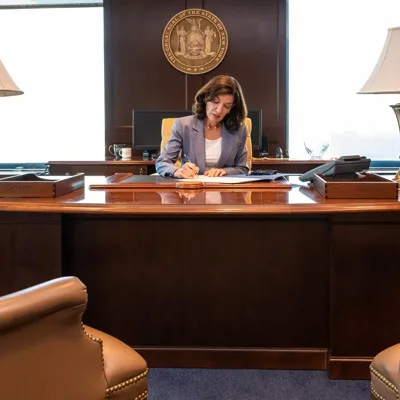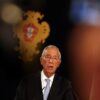
With less than a month left in the year, Gov. Kathy Hochul has made significant headway in signing or vetoing bills passed during the legislative session, but some of the most controversial bills approved by both chambers of the state Legislature still await her action. She has been working her way through hundreds of pieces of legislation since the end of the scheduled legislative session in June, and she has made significant progress on the nearly 900 bills that would need her signature. More bills are making their way to Hochul’s desk for action, but over 150 still need her signature – or veto.
The state Senate and Assembly jointly approved 896 pieces of legislation, which was not a record number, but impressive nonetheless. Of those, 791 have been acted on by the governor, leaving just 101 that still require her signature. The remaining four were proposed constitutional amendments that the governor takes no action on. But even as the numbers continue to decline, she still has not acted on some of the most controversial bills from the past year.
Governors in New York typically take time for their office to review legislation before requesting it from the Legislature. A governor has 10 days – minus Sundays – to sign or veto a bill before it automatically becomes law once lawmakers deliver it to her desk. Although lawmakers could do that any time they want, they generally wait until the governor asks for them to send the legislation in order to ensure she has sufficiently reviewed it or engaged in any additional negotiations for amendments to the bill before signage. Bills that the Legislature hasn’t sent or that Hochul doesn’t act on before the end of the year become subject to different rules, automatically getting vetoed after 30 days rather than automatically becoming law.
As Hochul continues to get through the backlog of bills, keep up with the legislation still up in the air with our non-exhaustive list. Bills the governor signed have been removed from the list. This post was last updated on Dec. 11.
Reparations commission – A7691/S1163A
Sponsored by Assembly Member Michaelle Solages and state Sen. James Sanders Jr., this bill would establish a commission to study the historical and lasting impacts slavery has had on Black New Yorkers and potential reparations for the legacy of slavery.
Grieving Families Act – A6698/S6636
Sponsored by Assembly Member Helene Weinstein and state Sen. Brad Hoylman-Sigal, the Grieving Families Act would allow the families of wrongful death victims to receive compensation for emotional harm they suffered. The bill has a decades-old legislative history and would update the state’s 175-year-old wrongful death statute. Hochul pocket-vetoed a version passed last year earlier this year.
Challenging wrongful convictions – A2878-A/S7548
Sponsored by Assembly Member Jeffrion Aubry and Myrie, this bill would make it easier for someone wrongfully convicted of a crime to have that conviction overturned, even if that person pleaded guilty, by removing procedural barriers to having new evidence heard by the court.
Even year elections – A4282-B/S3505B
Sponsored by Paulin and Skoufis, the bill would move most town, village and county elections outside of New York City to even-numbered years. The bill gained momentum at the end of the scheduled session and garnered controversy for the degree of change it would entail.
Public campaign finance tweaks – A7760/S7564
Sponsored by Assembly Member Latrice Walker and Myrie, this legislation would make changes to the state’s new public campaign finance program, including making the first $250 of any donation matchable. Currently, any donor who gives more than $250 either at once or in parts cannot have any of their donation matched in public funds unless the candidate returns the excess. The changes are opposed by good-government groups and advocates for public campaign finance, who charge that the tweaks will diminish the efficacy of the program as a means to get big money out of politics.
Noncompete ban – A1278-B/S3100A
Sponsored by Assembly Member Latoya Joyner and state Sen. Sean Ryan, the bill would ban most employers from forcing employees to sign noncompete agreements, with limited exceptions for broadcast employees. The legislation has faced fierce opposition on Wall Street and other major employers.
Closing the “Frankenstein” rent loophole – A6216B/S2980C
Sponsored by Assembly Member Linda Rosenthal and state Sen. Brian Kavanagh, this legislation seeks to close several loopholes that housing advocates have pointed out since the approval of the 2019 rent regulation laws. Most notably, it would prevent landlords from significantly hiking rents on so-called “Frankenstein” apartments when they combine two rent regulated apartments into a single unit. It would also prevent the landlord from removing the new apartment from stabilization even if one of the previous units was unstabilized.
New York Deforestation-Free procurement Act – A5682-A/S4859A
Sponsored by Assembly Member Kenneth Zebrowski and state Sen. Liz Krueger, the bill aims to ensure that companies contracting with the state are not contributing to tropical deforestation overseas. If signed, environmental advocates say that New York would be the first state to end its procurement of products that contribute to tropical deforestation.
Medical debt on consumer reporters – A6275A/S4907A
Sponsored by Paulin and state Sen. Gustavo Rivera, this legislation would prevent medical debt from impacting a person’s credit score by prohibiting hospitals and other health care providers from giving debt information to consumer reporting agencies.
LLC transparency – A3484A/S0995B
Sponsored by Assembly Member Emily Gallagher and Hoylman-Sigal, the legislation would define limited liability company beneficiaries and require those beneficiaries’ disclosure as a means to combat anonymous corporate ownership, like when an LLC owns rental properties.
Licensure for athletic trainers – A-219A/S-942A
Sponsored by Solages and state Sen. Jamaal Bailey, the bill would require licensure to be an athletic training, and would add athletic trainers to the list of mandatory reporters of child abuse.
Online accessibility – A0266A/S3114A
Sponsored by Assembly Member Chris Burdick and state Sen. John Mannion, this legislation would require state agencies to update their websites’ accessibility features to adhere to the most current best practices approved by the World Wide Web Consortium.
PTSD awareness – A0793/S7274
Sponsored by Assembly Member Pamela Hunter and state Sen. Kevin Parker, the legislation would require the Office of Mental Health within the state Department of Health to establish a training program to diagnose and treat PTSD in veterans.
Electric vehicle charging – A1122/S0110
Sponsored by Epstein and Krueger, this piece of legislation would require commercial garages with electric vehicle charging stations to ensure the public has access to those charging stations.
Utility billing information – A1368A/S0406A
Sponsored by Assembly Member Nily Rozic and Parker, this legislation would allow utilities, phone companies and cable providers to give billing information to third parties at the request of customers to aide in billing notices.
Building owner transparency – A1628/S2694
Sponsored by Assembly Member John McDonald and state Sen. Neil Breslin, this bill would require the disclosure of the people behind a limited liability corporation that owns a building or property leased to the state.
Monitoring drug price hikes – A1707A/S0599A
Sponsored by Assembly Member Daniel Rosenthal and state Sen. Julia Salazar, the legislation would require prescription drug companies to notify the state Department of Financial Services of their intent to raise the cost of a drug 60 days before it takes effect if the increase is at least 16% above its cost for the past two years.
Quicker insurance payouts – A2078/S5201
Sponsored by Assembly Member Steve Stern and state Sen. James Skoufis, this legislation would set standards to ensure more timely insurance payouts to claimants following natural disasters. The bill has a decadelong history, but this is the first time it passed both chambers.
NOTABLE VETOES
Lobbying transparency for gubernatorial nominees
Hochul vetoed legislation inspired by the 2023 session’s chief judge battle. The legislation would have required lobbying groups to disclose spending on campaigns for or against gubernatorial nominees, like the campaign run by the group Latinos for LaSalle in support of Hochul’s ill-fated nominee for chief judge. Hochul cited “significant new reporting requirements” and “implementation costs not already accounted for” in her veto memo.
Task forces and commissions
Hochul issued a blanket veto for 32 bills that would have created various task forces, commissions, offices, reports and the like. She offered a joint explanation that the proposals would have collectively incurred $35 million in unbudgeted expenditures and asserted that some of the bills were redundant.
Offshore wind wind transmission bill – A7764/S6218A
Hochul vetoed a bill that would have allowed parkland in the City of Long Beach on Long Island to have an offshore wind transmission line and would have helped expedite an ongoing project. But the legislation had strong local opposition, including from the local state legislators.
Electric bill transparency – A1190/S0334
The governor rejected legislation that aimed at making consumer’s electric bills more transparent by requiring utility companies to include certain additional information. Hochul noted that she vetoed an identical bill last year, stating that it would lead to more costs to the ratepayer that outweighs any benefit from increased transparency, as well as administrative burden on utilities.


